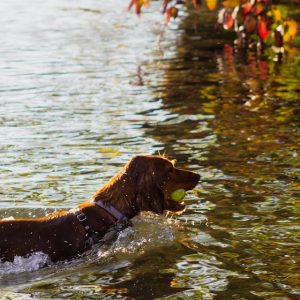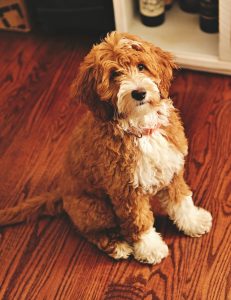Drying in a dog is a normal symptom - if not accompanied by other ailments. Dogs have a completely different physiology than humans. Look at them - they have hair on them. It's the equivalent of our outer garment. Imagine you're running in the sun, wearing your coat, and you can't take it off. After a while, you'll start sweating and looking for something cold to drink - the cooler the drink, the better.
Contents
- Most common reasons for panting in a dog
- Drying in golden retriever.
- Dogging in golden retriever vs. muzzle.
- Excessive panting in Golden Retrievers.
- Hypothyroidism.
- Tracheal problems.
- Pain.
- Heart failure.
- Obesity
- Accelerated breathing and stressful situations
- When does panting indicate illness?
- Inadequate feeding and lack of exercise affect your dog's panting.
- Dog panting at night - causes.
- Sneezing in a female dog.
What does it look like in dogs?
A dog may also pant when stimulated - for example, it gets excited during a sporting event, playing, or meeting another dog. It is worth remembering not to let such enthusiasm escalate too much, and if the dog shows an excessive tendency to such reflexes - work on calming down and teach the dog to relax. Exaggerated excitement is not healthy for the dog. It is only a nuisance - just like for the environment.
Most common reasons for panting in a dog
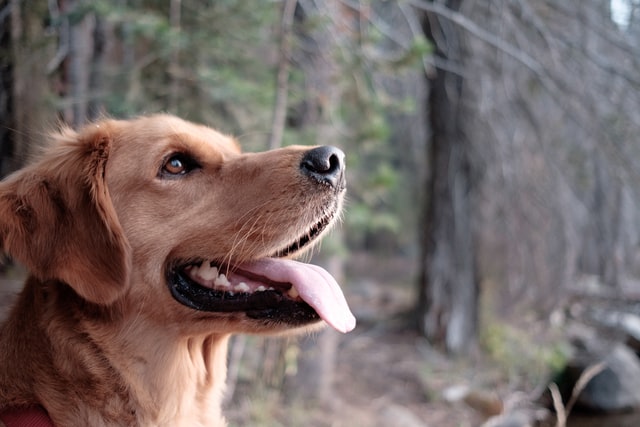
- Physical activity - dogs, like humans, breathe differently during and immediately after exercise. A human tries to take in air more often and harder - a quadruped does the same while simultaneously cooling down.
- Expression of emotions - every dog is different. They have different dispositions, letting us know their mood and condition differently.
- Playing - by playing with the dog, we experience no small amount of joy ourselves. These creatures willingly show their humour by jumping, running, wagging their tails, barking loudly, and panting.
Drying in golden retriever.
It is normal for dogs to pant. Moreover, it's necessary because as their body temperature rises, their skin doesn't sweat as in humans. Dogs sweat through the pads of their paws, but panting allows them to regulate their body temperature effectively. Rapid, shallow breathing with the muzzle open and tongue hanging out can be caused by excitement, panic, sudden pain, shock, or overheating. It can also occur after great exertion or during hot weather.
There are two types of panting: normal and abnormal. The former usually occurs when a dog's body overheats and is considered a natural, healthy reaction. On the other hand, abnormal panting can signify that your dog is struggling with a physical or emotional problem that requires consultation with a veterinarian.
You can tell the difference between normal panting and panting that should be worrisome, among other things:
- It occurs when it is not warm enough outside for your dog to regulate his body temperature by panting.
- If the panting is louder and wheezing, you should consult your veterinarian.
- If you have noticed that panting is much more of an effort for your dog than panting to cool his body.
Panting can also happen to obese and elderly dogs. If it does not last long and we guess its cause, there is no reason for concern. However, when it repeats frequently, it can indicate anaemia and internal bleeding.
On the other hand, rapid breathing without panting indicates that the dog's chest cannot expand or the lungs do not fill with air with each breath. This happens, for example, with rib fractures, but rapid breaths can also indicate severe heart failure. Deep, heavy breathing or wheezing indicates that the animal's airway is obstructed.
Dogging in golden retriever vs. muzzle.
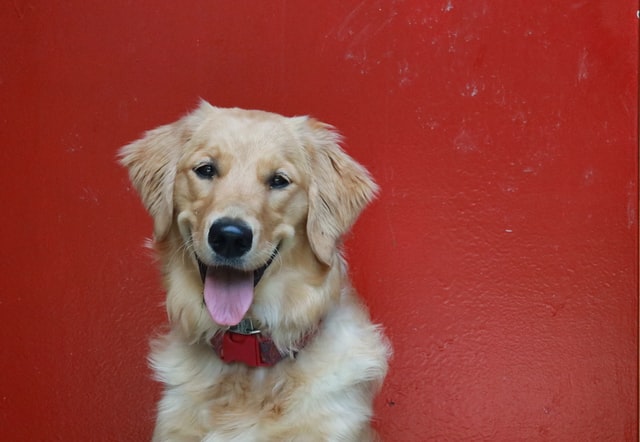
Many dog guardians believe that a muzzle is an unnecessary gadget. Unfortunately, this is erroneous thinking. There are situations in which it really comes in handy - only how to use it when it's hot outside?
It is worthwhile to familiarise your pet with the muzzle from an early age to save your dog stress when trying to put it on. The muzzle can prove useful in many situations. Firstly, it is required on public transport (trains, buses or streetcars). Secondly, the muzzle can be extremely useful if we do not know how the dog will react to veterinary procedures. In fact, a muzzle will work perfectly in all situations when we cannot predict our pet's reaction.
However, it is important to choose the right muzzle. You should bet on one in which the dog can feel comfortable, open its mouth, drink water, and, most importantly, breathe. Therefore, the best choice is a physiological muzzle, which allows the animal to pant and regulate the temperature when it needs to cool down. Do not put a veterinary muzzle - a fabric one - in which the dog cannot open its mouth or breathe!
Excessive panting in Golden Retrievers.
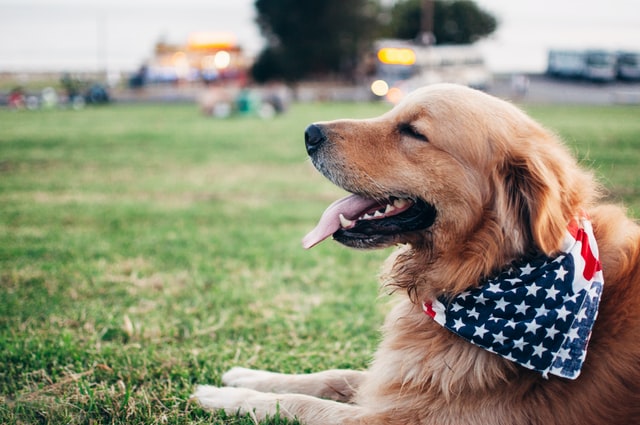
In addition to the cases mentioned above of normal panting, golden retrievers can also pant for several other more serious reasons that may require your attention. Below are factors that can lead to excessive panting in Goldens.
Hypothyroidism.
Your dog may be suffering from hypothyroidism - a prevalent condition. Is he panting even when it's not hot? Drags behind you on a walk instead of joyfully running ahead? On top of that, does he constantly have some skin problems, such as black spots? However, it is enough for the vet to prescribe medication and set the dosage, and your pooch will again enjoy life, walks, and summer.
Tracheal problems.
If panting is accompanied by a cringing sound, it may indicate a collapsing trachea. This is a problem mainly for older miniature breed dogs. A dog's trachea is not as rigid as ours. It is supported by muscle - the dog begins to choke when it becomes flaccid with age. This happens especially in moments of excitement and intensifies during hot weather.
Pain.
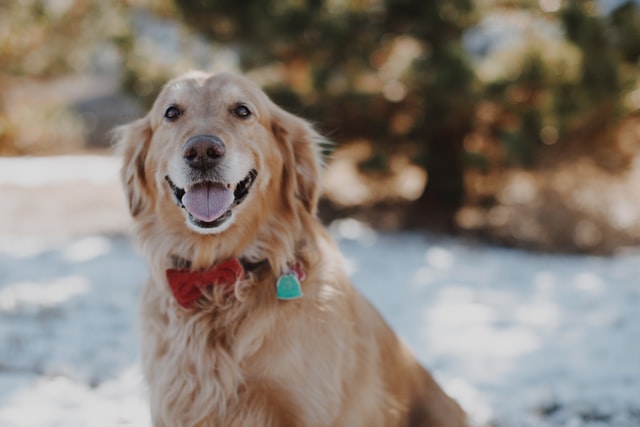
It's not hot or even cold, and the dog is panting. If on top of that, there's no reason for excitement, he's probably in pain about something. Take him to the vet to have his abdomen professionally groped and possibly examined.
Heart failure.
Your dog tires quickly, panting, and has a blue tongue, even though he's not a chow-chow? It could be a heart problem! Sometimes it is due to hypothyroidism. For example - the heart beats too slowly then. A veterinarian is needed!
Obesity
Because every heart, whether canine or human, suffers from its owner's obesity. In the case of some dog breeds (such as bulldogs), the problem is exacerbated by a stocky build, short paws, or a shortened muzzle that makes breathing difficult. We, too, tend to get out of breath even with little exertion when we carry too many pounds - and dogs do similarly.
Accelerated breathing and stressful situations
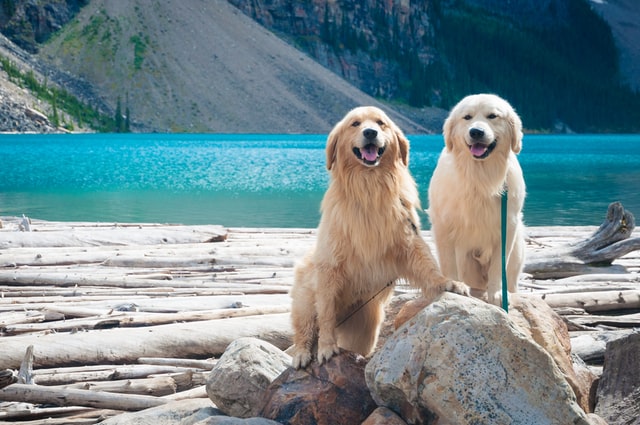
Dogs react differently to stress. One of the symptoms indicating that a dog is nervous may be just intense breathing. It is common for a dog to pant in situations new to him, such as a visit to the vet or a beauty salon. Careful observation will help you identify situations that make your pet nervous. This way, stress, and the associated persistent wheezing can be reduced to a minimum.
When does panting indicate illness?
If your dog is panting, what could be wrong. Usually, accelerated breathing is not the only sign of disease. In addition, there may also be:
- vomiting;
- fever;
- diarrhoea;
- lack of appetite;
- reluctance to play and walk.
Any of these symptoms should prompt you to visit your veterinarian. So if your dog is shaking and breathing rapidly, don't delay and contact your veterinarian.
Inadequate feeding and lack of exercise affect your dog's panting.
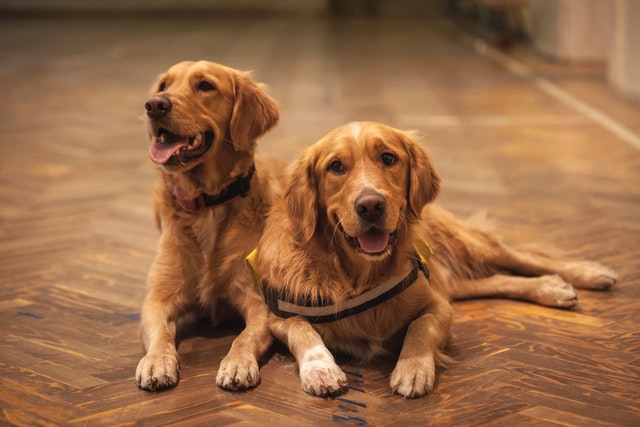
If your dog is frequently panting, pay attention to his physical condition. Obesity in pets is a growing problem. Obese dogs, like humans, tire faster, which can cause increased yawning in your dog. A diet tailored to your pet's needs and the right amount of exercise can help. It is good for the pooch to be under the constant care of a veterinarian during this time.
Dog panting at night - causes.
A dog panting loudly at night can be a nuisance to all household members. If you notice accelerated breathing in your dog, consider whether your pet is eating too heavy meals at night. These can put too much strain on your pet's digestive system. Another reason for your dog's panting could be excessive exercise or too long a walk before bedtime. The pet will be too tired in the evening, causing excessive and persistent yawning.
Sneezing in a female dog.
A dog may also wheeze during the heat. Both bitches and dogs may gasp for air loudly during this time. Consider having your pet spayed or neutered if this is quite a hassle. This procedure is also recommended for quadrupeds to avoid many health problems in the animal.
Loud wheezing in a dog is not always due to a mere physiological reaction. Dog owners should keep an eye on their pets so that, if necessary, help can be provided as soon as possible. If any of your pet's behaviour causes you concern, it's always a good idea to take your dog to the vet. The veterinarian will undoubtedly dispel any doubts and advise on what to do if your dog is panting from stress.

